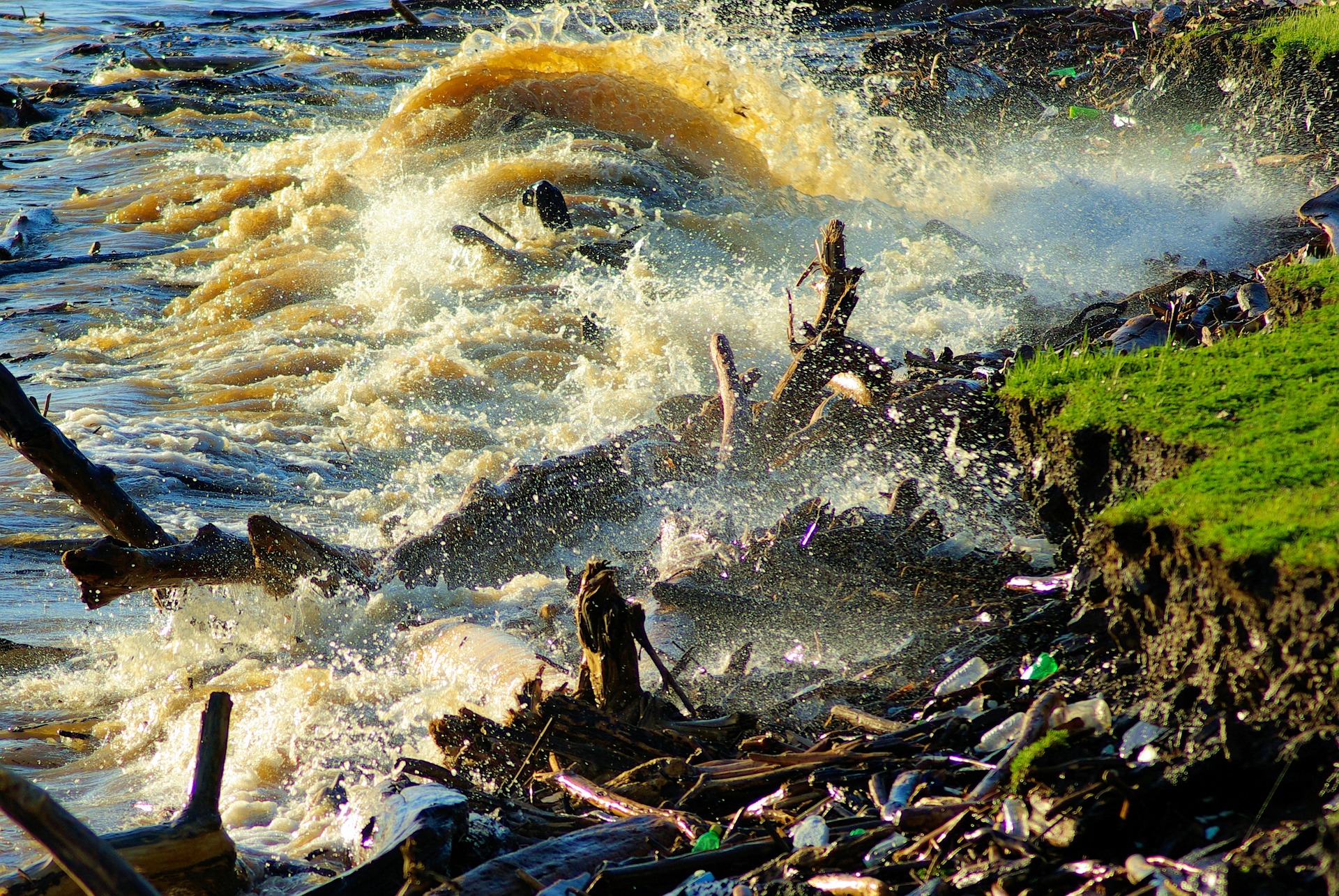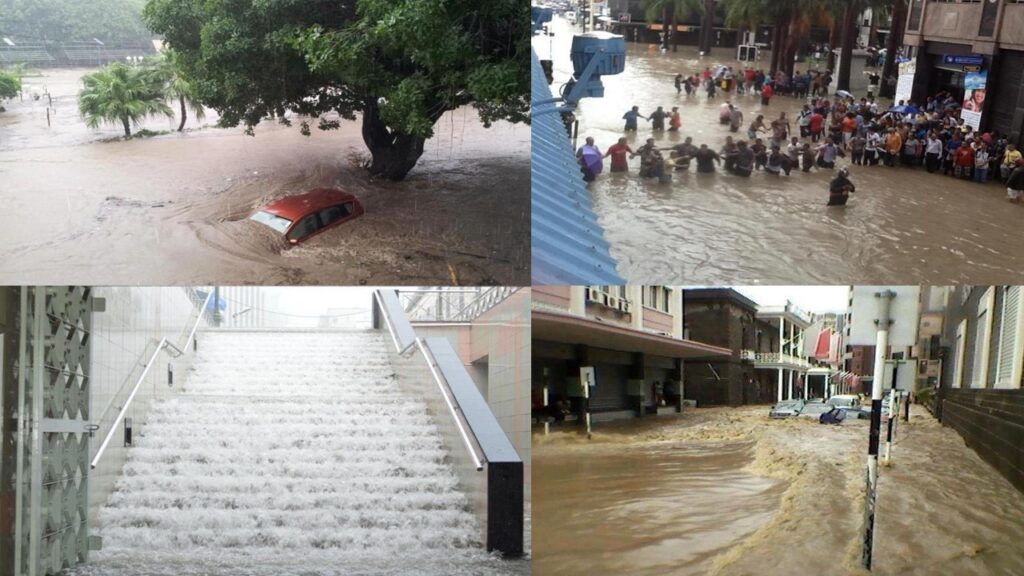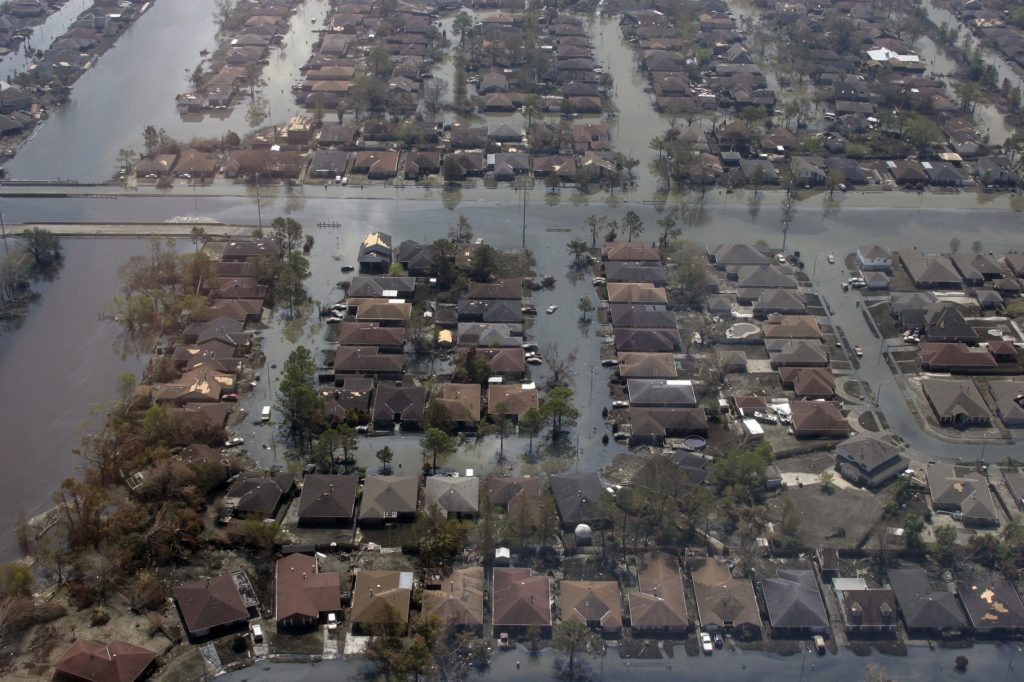Extreme Weather: Flash floods become frequent in Mauritius

2013. 7 people killed in a flash flood in the capital of Port Louis. Shocked and distressed citizens still remember the tragedy that floodwater caused in less than 2 hours. Since then, the nation of Mauritius becomes alert during heavy rainfall.

2013 flash flood in Mauritius, 15cm of torrential rain recorded in less than 2 hours in the city, Port Louis,11 people died, Image by Mauritius Flood Relief
Damages caused by floods
Every year, river and monsoon flooding cause a lot of damage to land and property around the globe. In 1998, the Yangtze River flood in China caused economic losses amounting to £12,815 million. Also, the California flood in the U.S in 2017 resulted in a $1.6 billion loss and 5 deaths. As it is, floods destroy crops, damage buildings, bridges and property, kill livestock, spread diseases and contaminate water supplies.
As for Mauritius, a flooding disaster risk modelling estimates direct losses to be in the $22 million and $5.2 million for emergencies.
What is happening today?
The reality of climate change
What climatic models predicted years ago are turning out for real today. Just like other natural calamities, flooding is getting on the rise around the world. As of 2015, more than 100 deaths have been recorded in the U.S only due to flooding. While the phenomenon used to occur mainly near waterways and during storms and surges, nowadays, global climate change has reversed the situation. Cities and urban areas are hit by disastrous floods wiping away everything along their paths and causing damages costing millions.

Increase in global temperature
As it currently stands, global temperature has increased by 0.8 °C since 1880. While it may not seem like a big deal, a 1 °C drop in temperature was enough to cause the Little Ice Age in the 1600s. The Baltic sea and most rivers in Europe actually froze.
Temperature increase in Mauritius
Since the industrial revolution, an increase in the use of fossil fuels and an ensuing release of greenhouse gases into the atmosphere, has led to the planet heating up. Statistical data for Mauritius shows that there has been an average increase in temperature by 0.6°C from 2007 to 2016, with a general mean increase of 0.15°C every decade.
Increased evaporation over water bodies
With warmer temperatures, evaporation also increases over large water bodies like the oceans and seas. Inevitably, this leads to cloud formation and zones of instability which further triggers cyclone development. While cyclones are influenced by many climatic factors, increased evaporation induces the formation of cloud masses and consequently rainfall. The effects of such cloud masses hitting the land are devastating like the past flood event in Mauritius.
Rainfall patterns are shifting due to global warming
Mauritius has a distinct rainy season from November to April and a dry season from May to October. The mean annual rainfall is 2100 mm per year. It is very interesting to note that there has been a decrease in the recorded amount of rain per decade on the island by 57 mm or 8% compared to the 1950s.
Drop in the amount of rainfall yet increased frequency of torrential rain and flash floods?
Climate change and extreme events
Climate change is shifting the odds toward extreme events. Small changes in climatic conditions are having great repercussions on local weather. A small change in weather variable like temperature is leading to disastrous events. Nonetheless, it is a global phenomenon: floods have been recorded all over the world since January 2019. America, Africa, Asia, Australia, Europe also testify to catastrophic inundations.
Human-induced flooding
While climate change is having its toll on local weather, it is also evident that human development also aggravates the flooding issue.
- Construction of dams and levees,
- Illegal construction on risk-prone zones,
- Riverine engineering,
- Draining and filling of wetlands,
- Deforestation,
- Surface asphalting
are all contributing factors that inhibit the natural flow of water during heavy rainfall.
Predicting flash floods
According to the 2018 IPPC report, increasing temperatures will increase the amount of rainfall and hence the intensity of flooding on land. However, predicting the amount of rainfall is different from weather forecasting. The procedure is quite complex and even more so for isolated islands as compared to continental land.
Water drainage system in Mauritius
Volcanic islands, like Mauritius, are full of dents and peaks. These topographic features do not conform to General Circulation Models (climate models) resulting in estimates with large uncertainties. The drainage basins on the island are also small and have little capacity to store water when compared to others in the world.
During rainfall, the streams fill up and flush out quickly; in this way, rainwater spends short times in basins. The consistency of the soil in the channels also does not permit much water to infiltrate. Though Mauritius is an old island, stream erosion has been ongoing for the past 5-6 million years: the ground itself is still young to imbibe large amounts of water.
What should be done?
When environmental shocks like flooding hit a country, it creates an uproar amongst the population. Natural calamities happen anytime and anywhere and so the wisest thing to do first is to get informed. Families have to prepare for upcoming calamities especially now that we are living in the climate change era. Communities have to get together and strengthen local protection means. Leaders must evaluate the Environmental Impact Assessments of projects before embarking on them.
Howbeit, predicting precipitation is not totally accurate even when using computer models. What is happening around the world due to climate change is greater than what was predicted. Materials, software and expertise needed in this field cost a lot. If the government can afford it, so much better for the nation, else proper drainage and resilience strategies have to be effected.
References:
- The World Bank. (2016). Disaster Risk Profile, Mauritius. [pdf]. The International Bank for Reconstruction and Development: Washington, United States of America
- IPCC, 2018: Summary for Policymakers. In: Global Warming of 1.5°C. An IPCC Special Report on the impacts of global warming of 1.5°C above pre-industrial levels and related global greenhouse gas emission pathways, in the context of strengthening the global response to the threat of climate change, sustainable development, and efforts to eradicate poverty [Masson-Delmotte, V., P. Zhai, H.-O. Pörtner, D. Roberts, J. Skea, P.R. Shukla, A. Pirani, W. Moufouma-Okia, C. Péan, R. Pidcock, S. Connors, J.B.R. Matthews, Y. Chen, X. Zhou, M.I. Gomis, E. Lonnoy, T. Maycock, M. Tignor, and T. Waterfield (eds.)]. World Meteorological Organization, Geneva, Switzerland, 32 pp
- Staub, C.G., Stevens, F.R, and Waylen, P.R. (2014). The geography of rainfall in Mauritius: Modelling the relationship between annual and monthly rainfall and landscape characteristics on a small volcanic island. Applied Geography, 54: 222-234

Pingback: Flooding Explained: Types, Causes and Examples - Yo Nature
Pingback: Climate change: Natural and Anthropogenic causes - Yo Nature
Pingback: What is global warming? - Yo Nature
Pingback: The negative impacts of humans on the environment - Yo Nature
Pingback: The rivers of Mauritius - Yo Nature